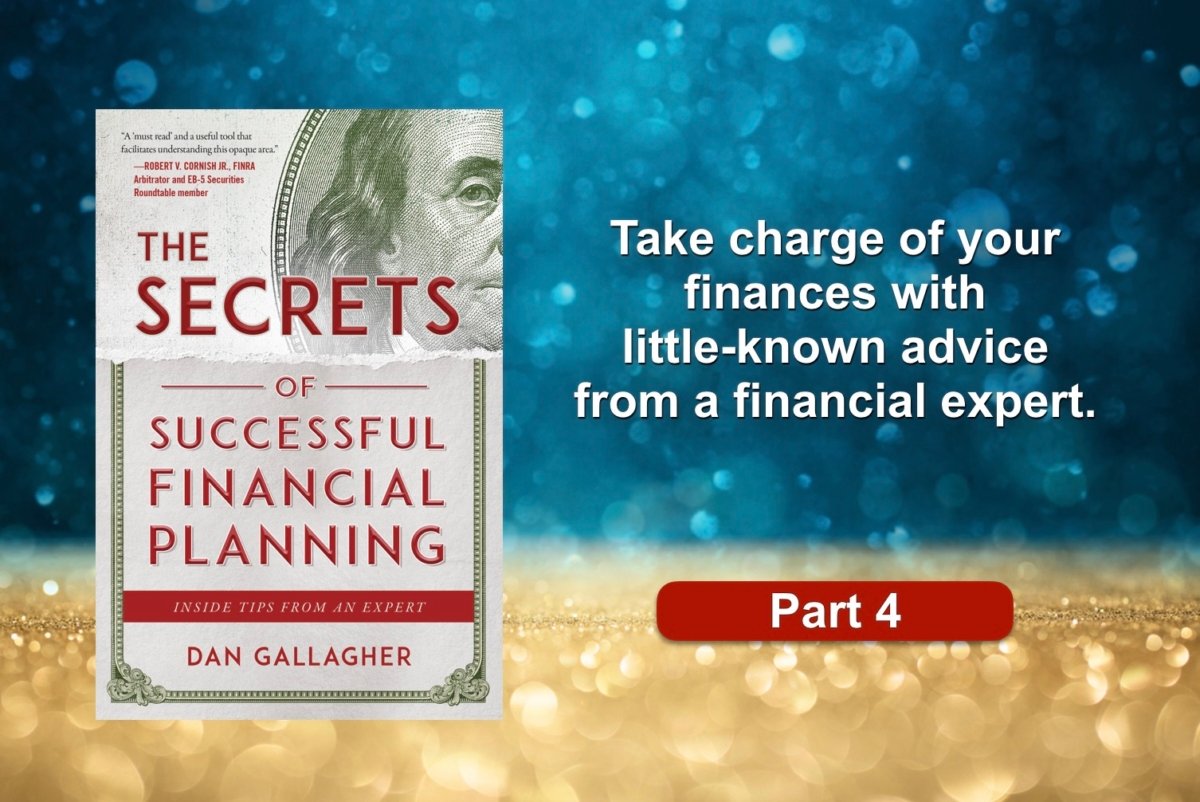Inside Tips From an Expert (Part 4)

Firms and Compliance Departments
Firms as well as individual professionals may be researched online now, but note this about firms: There is no investment or insurance manufacturer that has never had any lawsuits, settlements, or fines. Keep this in perspective and realize that when bad practices are discovered and dealt with, these manufacturers do fix their systems. For example, when Wells Fargo got disciplined for having account reps open numerous bogus accounts for people so some of its managers could get bonuses, the damage to individuals was limited to the account fees; the bad apples got purged. To assume that Wells is still bad now would be inaccurate, and cause you to miss evaluating a fine firm that could benefit you.
Justifiable public impatience grew over the last century whenever scams or even individual abuses hit the news. Regardless of sensationalism and bias that may or may not exist in some media, something had to be done to limit abuses, and that means power, either contractual or regulatory. Both evolved. The investment and insurance industries both devised self-regulatory organizations for fear of regulation being imposed without much free market perspective. To sell products or advice, professionals—all agents of some sort—had to agree contractually to rules and enforcement, or else they could not have access to financial products or legally sell advice. Laws filled the gaps, such as registration and audit of fee-only and fee-and-commission advisors. The carefully designed systems of the entire world evolved, led by the U.S. model. But no system is perfect, and it remained possible for harm or small-scale inefficiencies of advice or sales to disadvantage consumers, either through negligence or deception.
In the last twenty years, compliance departments within financial firms have grown huge. They monitor email and other communications, prevent ads and other communications from over-promising or misrepresenting, and deter a host of other complicated bad acting. The monitoring technology alone is impressive and even shrouded in secret so as not to be easily evaded. To place this in perspective, consider that a tax preparer is a compliance agent for the IRS, despite the fact that he or she does the work your government requires of you. As a society, a majority got used to this method of doing “tax business,” the personal income tax system as a way of paying national bills. Fine, but consider what tax consultants are, to a great degree: They let you do only what tax law allows, thereby functioning as compliance officers for you. To some extent, they are government agents. So within investment producing firms and brokerages, a third type of enforcement has arisen: internal compliance departments. If you feel bamboozled or poorly guided, appeal to this department simultaneously with your advisor’s manager; your complaint may go nowhere otherwise. But know that this three-tiered compliance system—internal, self-regulatory, and legal (not to mention potential lawsuits)—is a very expensive system for protecting you. Unfortunately, it is essential, despite a few excesses that irritate individual professionals. Why essential? Again, the stakes are high, and that’s why we care about more than regulation and enforcement; we must focus on who really will serve your best interest.
Are the currently delayed regulations, which make all brokers and financial advisors fiduciaries to clients, workable and needed beyond the existing system of monitoring and enforcement? In current form, they actually force product issuers’ reps to recommend competitors’ products. Are we now crossing the threshold, as many professionals complain, of regulation harming the public more than it helps? The recent regulations have sowed confusion and fear among honest professionals. Cerulli and Associates has begun tracking an uptick in retirement of advisors. There may also be a trend of advisors limiting which products they offer so as to avoid what they feel are onerous burdens of paperwork and interference in their investment and insurance recommendations. Some have gone to fee-only advice and—note this—they may refuse to evaluate the quality of financial products that they diagnose are needed by their clients. Imagine: You get a great financial plan, then essentially hear, “You’re on your own as far as selecting which products to buy.” That has started to happen.
There are State Farm agents and other one-brand or limited—brand agents who are retiring because of lower commissions (which are in turn due to the costs of regulation and compliance). They know they cannot shop the market for the best product. They can only offer very fine and competitive ones and lack a way to evaluate the best, let alone offer products that compete with those of their employers. Yet there is a very good reason State Farm and some other carriers became so strong nationally: fine, honest agents, genuinely caring of their clients and offering extremely competitive products from their principals. Perhaps the business model of captive agents is a dinosaur—I do not know. I must admit that when I had clients, I was totally independent or almost so for most of my thirty years so I could be more competitive. The bottom line for you is that you deserve the best accounts and the most able advice, not merely some mix of “good” and great.
Fee-Only Equals Unbiased?
You may have encountered ads that tout fee-only advisors as unbiased because they do not earn commissions. News flash: They are just as susceptible to bias as commissioned advisors! The fee-only model can actually be detrimental to the consumer. Fee-only advisors earn most of their fees from asset management, either personally managing the buy-sell-hold decisions day-to-day or by earning a fee from the money management firm they select for the client’s account. The larger that account, the greater the fee. But what if the client’s best move is to buy a single-pay life or long-term care policy, or what if they might need a fixed/guaranteed annuity to match up to their guaranteed-to-incur expenses? Well, purchasing such lump-pay products would take away major chunks of the assets available for the fee-only advisor to manage, hence the same potential for bias with fee-only advisors as with commissioned ones. Get an individualized analysis that identifies which types of accounts are most prudent for you to own, given your individual needs. You must trust the human being, and not distrust merely on the basis of method of compensation. A secret to finding this is to ask the advisor to show you financial plans in which he or she recommended product purchases and the rationale (with client names removed), or to demonstrate that his or her firm routinely handles both products and fee-based advice.
Through all this history, stock brokerage, insurance brokerage, and advisory “houses” from Merrill Lynch to Ameriprise to Wells Fargo expanded their product mix. But was it to find the most competitive product in every category? No. For complex reasons of constitutional law, producers of products like mutual funds or annuities experience market competition that keeps them trying to offer great stuff; it’s not regulation that improves products. These firms are not held to the fiduciary standard as their individual representatives are (or soon likely will be).
Now, imagine this: The new regulations decree that the reps are, individually, fiduciaries charged with having your best interest at heart. Yet the employers of these firms produce their own brand products and select a mix of competing products to sell alongside their own. These employers are not held to the standard. Firms use two criteria to select products for sale.
- Maximizing profit margin for the shareholders (the commission a rep gets is just a part of this larger “gross concession to the dealer,” or GDC). Shall we declare that these firms must earn no profit? Is that fiduciary? On the surface, it seems fiduciary, but what of incentive to compete, to innovate and improve? Historically, these two “social goods” have been absent for consumers in command economies and sectors where profits are regulated rather than determined by competition. The harder it is to explain a product, the more skilled the rep must be to explain it, and this is among the factors driving commission level. A limited partnership composed of real estate or oil leases has a higher profit potential for the consumer than most products, but also has a very high GDC.
- The other main factor brokerages use in selecting products to broker is minimization of lawsuits from people claiming that commissions or potential surrender charges are high or hidden (whatever “high” means). So they sell “restricted illiquidity” products, like back-end mutual funds, REITs, and annuities, but ignore some potentially superior ones whose liquidity limitations are above average. Yes, this lawsuit intimidation factor has become that significant to brokerages. Recall the earlier example of annuity carriers having become leery, accepting only about half of what one can invest, so the legal environment restricts consumer choice. The income you get from annuities that have high potential surrender charges is almost always higher than those the large brokerages sell. Why? Because the annuity company can get a higher return if it’s confident that its accounts will not be demanded to liquidate frequently; this enables it to guarantee higher income to the consumer. However, brokerages have become intimidated by lawsuits over high surrender charges, allegedly improperly committed to via bad advice, and so a new industry standard has evolved: None sell annuities with surrender charge schedules longer than six or seven years, nor with starting potential surrender charges higher than five or six percentage points. They instruct their reps to tell consumers that this is a better value because of the lower surrender charge, yet they cannot disclose that the income is very much lower in these than in annuities with greater surrender charge patterns.
“Oh, no problem,” says one consumer. “I’ll just buy Vanguard funds or its no-load in-or-out annuity, or I’ll buy from my mutual insurance company because they don’t make a profit for shareholders. That will maximize my value.” Hmm. A little common sense here: What are the odds that one company, like Vanguard, Fidelity, MFS, or any other you name, has all of the very best-managed funds and annuities—all the best? No such company has ever claimed to the public that they did, for that would be an obvious untruth. Even those who have the best of “whatever” for a few years eventually lose research staff or managers, or have random losses. And does Vanguard offer an annuity that guarantees against market losses, yet pays interest based upon the market? No, that innovation occurs where the profit margin allows innovation and carrier risk-taking; true risk transference is sold to consumers. No one can deny that Vanguard, Knights of Columbus, Thrivent Financial, and Mass Mutual built their brands on serious resources that enable them to stay very competitive. But there is, actually, profit in their products. It just does not go to stockholders; it is split between personnel compensation and consumer dividends of one form or another.
(To be continued …)
This excerpt is taken from “The Secrets of Successful Financial Planning: Inside Tips From an Expert,” by Dan Gallagher.
To read other articles of this book, click here .
To buy this book, click here.
The Epoch Times Copyright © 2023 The views and opinions expressed are those of the authors. They are meant for general informational purposes only and should not be construed or interpreted as a recommendation or solicitation. The Epoch Times does not provide investment, tax, legal, financial planning, estate planning, or any other personal finance advice. The Epoch Times holds no liability for the accuracy or timeliness of the information provided.



